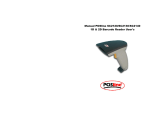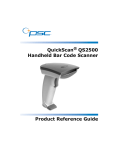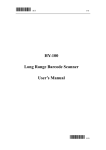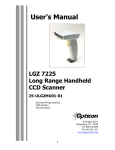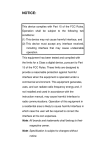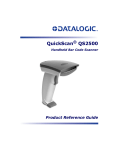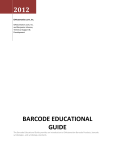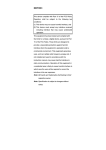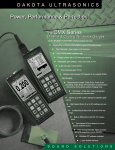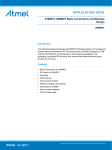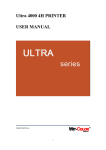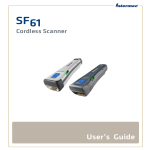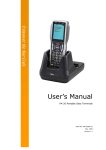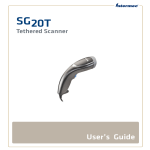Download User Manual - ID Automation.com
Transcript
1 Limited Warranty ........................................... 4 USB Keyboard Emulation [Default].......... 5 Keyboard Wedge ........................................ 5 Default Symbology Settings .......................... 6 Programming the Scanner .............................. 7 Symbology Settings ....................................... 8 UPC-A........................................................ 8 UPC-E ...................................................... 11 EAN-13 .................................................... 14 EAN-8 ...................................................... 16 Code 128 & GS1-128............................... 19 Code 39 .................................................... 22 Codabar .................................................... 26 Code 93 .................................................... 30 Code 11 .................................................... 32 GS1 DataBar ............................................ 34 GS1 DataBar Limited............................... 36 GS1 DataBar Expanded ........................... 38 Interleaved 2 of 5 (ITF)............................ 40 Matrix 2 of 5 ............................................ 44 MSI/Plessey ............................................. 46 PDF417 .................................................... 50 Standard 2 of 5 ......................................... 52 Telepen ..................................................... 54 China Post ................................................ 56 2 Italian Pharmacode................................... 58 Interface Selection........................................ 60 Keyboard wedge....................................... 61 RS-232 ..................................................... 65 Wand Emulation....................................... 68 Scan Configuration....................................... 70 Indications .................................................... 74 String Settings .............................................. 76 Transmission ................................................ 80 Barcode Symbol Test Chart..........................84 ASCII Code Table ........................................ 86 Parameter Setting List .................................. 88 Scanner Specifications ................................. 90 3 Limited Warranty This product is warranted by IDAutomation against manufacturing defects in material and workmanship under normal use for 1 year from the date of purchase. The warranty may be extended if the Extended Warranty is purchased at the time of the order. IDAutomation reserves the right to make changes in specifications and other information contained in this document without notice. IDAutomation shall not be liable for technical or editorial errors or omissions contained herein; nor for incidental or consequential damages resulting from the furnishing, performance, or use of this material, or the related product. IDAutomation’s total liability arising out of or in connection with the application or use of any product or application described herein shall be limited to the greater of ten (10) times the amount actually paid for the product that was purchased from IDAutomation or US $5.00. All software related to this product, including embedded software, is subject to the terms and conditions of IDAutomation’s Software License Agreement, which is available online at: http://www.idautomation.com/software-license.html Copyright © 2004-2008 IDAutomation.com, Inc. IDAutomation and the IDAutomation.com "your source for quality symbology" Logo are trademarks of IDAutomation.com, Inc. in the United States and/or other countries. GS1 and DataBar are trademarks of GS1.ORG. All other trademarks mentioned are the property of their respective owners. 4 Introduction - Installation USB Keyboard Emulation [Default] 1) 2) Connect the USB cable between scanner and PC. Your operating system will automatically detect the USB device and emulate a USB keyboard. Keyboard Wedge 1) 2) 3) 4) Power off the terminal/computer. Disconnect the keyboard cable from the back of the terminal/computer. Connect the appropriate interface cable to the scanner and to the terminal/computer. Turn the terminal/computer power on. Note: If any of the above operations do not work, turn off the power, reseat the cable on the scanner and on the PC and go through all the above steps again. 5 Default Symbology Settings The default setting for each barcode is shown in the chart below: Code Type Read Checksum Checksum Enable Verification Transmission Enable Enable Code ID UPC-A V V V A UPC-E V V V E EAN-13 V V V F EAN-8 V V V FF Code-39 V Interleaved 2 of 5 V i Industrial 2 of 5 - - i Matrix 2 of 5 B Codabar % Code-128 & GS1-128 V V # Code-93 V two digits & Code-11 V one digit O MSI/Plessey V @ UK/Plessey V @ Telepen S Standard 2 of 5 V V i GS1 DataBar (RSS) V R4 GS1 DataBar (RSS) Limited V RL GS1 DataBar (RSS) Expanded V RX China Post t Italian Pharmacode. p PDF417 V 6 Programming the Scanner To program the scanner, you must scan a series of programming barcodes in the correct order. In the back of this manual, you will see a table of alphanumeric barcodes, which are used to program the various options available. To program each option, you must: 1. Scan the Program barcode on the parameter setting page. 2. Enter the option mode by scanning the Option Bar Code. 3. To the right of the option barcode, the corresponding alphanumeric inputs are listed. Scan these alphanumeric entries from the back of the manual. Default properties are designated with an asterisk “*”. 4. Scan the Finish barcode from the back of the manual. 5. Scan the Exit barcode, listed on the lower right hand corner of each parameter setting page. 7 Symbology Settings UPC-A Information about this symbology is available at: http://idautomation.com/upceanfaq.html Format: Leading Zero Data Digits (11 Digits) Check Digit Checksum transmission: By setting to Enable, the checksum will be transmitted. Truncate leading/ending: The leading or ending digits of the barcode data characters can be truncated when these values are set to non-zero. Code ID setting: Code ID setting is a character used to represent the symbol upon a successful reading. A Code ID setting is prefixed to the beginning or ending if the feature is selected. If you want to transmit the Code ID, you must set the Code ID transmission to Enable first. Refer to Code ID transmission. Insertion group selection: The scanner offers one or two insertion groups by setting one or two digits to indicate which insertion group you want to insert. Refer to Character insertion. Example: Group 2 → set 02 or 20. Group 1 and 4 → set 14 or 41. Program Option Bar Code Option Alphanumeric Entry Disable 00 Enable 01* Read 8 Disable 00 Enable 01* Disable 00 Enable 01* 0-15 00-15 Checksum verification Checksum transmission 00* Truncate leading 0-15 00-15 00* Truncate ending 00-ffH ASCII 00-ffH code < A >* 00-44 00-44 Code ID setting 00* Insert group selection Exit 9 UPC-A Supplement digits: The Supplement digits barcode is the supplemental 2 or 5 characters for the UPC code. Format: Leading Data Digits Check Zero (11 Digits) Digit Supplement Digits 2 or 5 or UCC / EAN 128 Truncation / Expansion: The leading “0” digit of the UPCA data characters can be truncated when the function is enabled. Program Option Bar Code Supplement digits Truncation/ Expansion Option Alphanumeric Entry None 00* 2 digits 01 5 digits 02 UCC/EAN 128 03 Auto detection 04 None 00 Truncate 01* Leading zero Expand to 02 EAN13 Exit 10 UPC-E Information about this symbology is available at: http://idautomation.com/upceanfaq.html Format: Leading Zero Data Digits (6 Check Digit Digits) Checksum transmission: By setting to Enable, the checksum will be transmitted. Program Option Bar Code Option Alphanumeric Entry Disable 00 Enable 01* Disable 00 Enable 01* Disable 00 Enable 01* Read Checksum verification Checksum transmission Exit 11 UPC-E Truncate leading/ending: Refer to Truncate leading/ending of UPCA. Code ID setting: Refer to Code ID setting of UPCA. Insertion group selection: Refer to Insertion group selection of UPCA. Supplement digits: Format: Leading Zero Data Digits Check Supplement Digits (6 Digits) Digit Truncate Leading zero: Refer to Truncate Leading zero of UPCA. Expansion: The expansion function is used only for UPCE and EAN-8 code reading. It extends the barcode when the feature is enabled. Example: Barcode “0123654” Output: “0012360000057” UPCE-1: Enables scanner to read UPCE with the leading digit of 1. Program Option Bar Code Option 0-15 Alphanumeric Entry 00-15 00* Truncate leading 0-15 00-15 00* Truncate ending 00-ffH ASCII 00-ffH code < E >* Code ID setting 12 00-44 00-44 00* Insert group selection Supplement digits None 00* 2 digits 01 5 digits 02 UCC/EAN 128 03 Auto detection 04 Disable 00* Enable 01 Disable 00* Enable 01 Disable 00* Enable 01 Truncation/Expansion Expansion *OAM* UPCE-1 Exit 13 EAN-13 Information about this symbology is available at: http://idautomation.com/upceanfaq.html Format: Data Digits (12 Digits) he Check Digit Program Option Bar Code Option Alphanumeric Entry Disable 00 Enable 01* Disable 00 Enable 01* Disable 00 Enable 01* 0-15 00-15 Read Checksum verify Checksum transmission 00* Truncate leading 0-15 00-15 00* Truncate ending 14 Exit EAN-13 Code ID setting: Refer to Code ID setting of UPCA. Insertion group selection: Refer to Insertion group selection of UPCA. Supplement digits: 2 or 5 or UCC / EAN 128 Program Option Bar Code Option Alphanumeric Entry 00-ffH ASCII code 00-ffH < F >* Code ID setting 00-44 00-44 00* Insert group selection Supplement digits None 00* 2 digits 01 5 digits 02 UCC/EAN 128 03 Auto detection 04 Disable 00* Enable 01 ISBN/ISSN conversion Exit 15 EAN-8 Information about this symbology is available at: http://idautomation.com/upceanfaq.html Format: Data Digits (7 Digits) Check Digit Checksum transmission: By setting to Enable, the checksum will be transmitted. Truncate leading/ending: Refer to Truncate leading/ending of UPCA. Code ID setting: Refer to Code ID setting of UPCA. Insertion group selection: Refer to Insertion group selection of UPCA. Program Option Bar Code Option Alphanumeric Entry Disable 00 Enable 01* Disable 00 Enable 01* Disable 00 Enable 01* Read Checksum verification Checksum transmission 16 0-15 00-15 00* Truncate leading 0-15 00-15 00* Truncate ending Two characters 00-ffH, 00-ffH 00-ffH ASCII code < FF >* Code ID setting 00-44 00-44 00* Insert group selection Exit 17 EAN-8 Program Expansion: Refer to Expansion of UPCE. Option Bar Code Supplement digits Supplement digits Option Entry None 00* 2 digits 01 5 digits 02 UCC/EAN 128 03 Auto detection 04 None 00* 2 digits 01 5 digits 02 2,5 digits 03 UCC/EAN 128 04 2, UCC/EAN 128 05 5, UCC/EAN 128 06 All 07 Disable 00* Enable 01 Disable 00* Enable 01 Truncation/Expansion Expansion Exit 18 Code 128 & GS1-128 Information about this symbology is available at: http://idautomation.com/code128faq.html Format: Data Digits (Variable) MOD 103 Checksum (Required) Checksum Verification: The checksum is the mod 103 of all data digits. Checksum Transmission: By setting to Enable, the checksum will be transmitted. Program Option Bar Code Option Entry Disable 00 Enable 01* Disable 00 Enable 01* Disable 00* Enable 01 Read Checksum Verification Checksum Transmission Exit 19 Code 128 & GS1-128 Max./Min. code length: Refer to Max./Min. code length of Code-39. Truncate leading/ending: Refer to Truncate leading/ending of UPCA. Code ID setting: Refer to Code ID setting of UPCA. Insertion group selection: Refer to Insertion group selection of UPCA. GS1 Format: Code 128 may be translated according to the GS1-128 (UCC/EAN-128) format if it starts with an FNC1 character. When enabled, the first FNC1 will be translated to “]C1”, and FNC1 codes thereafter in the same symbol will be a <GS> (1D16) field separator code. For example: ]C1 Data <GS> Data Checksum FNC2 Append: When enabled, if the scanner reads a barcode that includes the FNC2 code it is not transmitted until a barcode is scanned that does not include the FNC2. GS1 (UCC/EAN) 128 ID setting: Sets the Code ID for GS1-128 output format. Field Separator Code: This feature is only used for the GS1-128 format. The Field separator code reassigns FNC1 codes (that are not the first FNC in the barcode) to another value. The default of ASCII code is <GS>(1D). Program Option Bar Code Option 00-64 Entry 00-64 00* Max. code length 00-64 00-64 00* Min. code length 20 0-15 00-15 00* Truncate leading 0-15 00-15 00* Truncate ending 00-ffH 00-ff ASCII < # >* 00-44 00-44 Code ID setting 00* Insert group selection Standard 00* GS1-128 01 Disable 00* Enable 01 00-ffH 00-ff ASCII < 1D >* 00-ffH 00-ff Format Append GS1-128 ID ASCII 1D* Field separator code 21 Exit Code 39 Information about this symbology is available at: http://idautomation.com/code39faq.html Format: Start “*” Data Digits ( Variable) Checksum (Optional) End “*” Checksum verification: The checksum of Code-39 is optional. Checksum transmission: By setting to Enable, the checksum will be transmitted. Program Option Bar Code Option Alphanumeric Entry Disable 00 Enable 01* Disable 00* Enable 01 Disable 00* Enable 01 Read Checksum verification Checksum transmission Max./Min. code length: Each symbology has its own Max./Min. Code Length. They can be set to qualify data entry. If their Max./Min. Code Length is zero, the Global Min./Max. Code Length is in effect. The length is defined as to the actual barcode data length to be sent. Data with lengths exceeding these limits will be rejected. If the Minimum length setting is greater than the Maximum length setting, the symbology will not be readable. Format: Full ASCII Code-39 is an enhanced decoding of 22 Code-39 that combines one of the digits +, %, $ and/ with one of the other digits (A to Z). Option Bar Code Option 00-64 Alphanumeric Entry 00-64 00* Max. code length 00-64 00-64 00* Min. code length 0-20 00-20 00* Truncate leading 0-15 00-15 00* Truncate ending 00-ffH ASCII code 00-ffH <*> Code ID setting 00-44 00-44 00* Insert group selection Standard 00* Full ASCII 01 Format Code 39 23 Exit Append: This function allows several symbols to be concatenated and decoded as one single data entry. The scanner will not transmit the embedded appending code (space for Code-39). If Enabled and other symbols were read again with the appended code, then codes will be transmitted without Code ID, Preamble and Prefix. When a symbol is decoded without the appended code, the data will be transmitted without Code ID and Prefix, but the Postamble Suffix codes are appended. This function is used when the first number of code 39 is a space. Example: <space>123456. Start/end transmission: The start and end characters of Code-39 are“*”. You can transmit all data digits including the two “*”. Program Option Bar Code Option Alphanumeric Entry Disable 00 Enable 01 Disable 00 Enable 01 Append Start/end transmission Exit 24 For all settings related at Truncate leading/ending, Code ID setting and Insertion Group selection, refer to the appropriate section of UPCA. 25 Codabar Format: Start Data Digits (Variable) Checksum (Optional) End Checksum Verification: Verifies the MOD 16 check digit. Checksum Transmission: By setting to Enable, the checksum will be transmitted. Max./Min. code length: Refer to Max./Min. code length of Code-39. Truncate leading/ending: Refer to Truncate leading/ending of UPCA. Code ID setting: Refer to Code ID setting of UPCA. Program Option Bar Code Option Alphanumeric Entry Disable 00* Enable 01*(8110) Disable 00* Enable 01 Disable 00* Enable 01 Read Checksum Verification 26 Checksum Transmission 00-64 00-64 00* Max. code length 00-64 00-64 00* Min. code length 0-15 00-15 00* Truncate leading 0-15 00-15 00* Truncate ending 00-ffH ASCII code 00-ffH < % >* Code ID setting Exit 27 Codabar Insertion group selection: Refer to Insertion group selection of UPCA. Start/End type: Codabar has four pairs of Start/End patterns; you may select one pair to match your application. Start/End Transmission: Refer to Start/End Transmission of Code 39. Program Option Bar Code Option 00-44 Alphanumeric Entry 00-44 00* Insert group selection Start/End type ABCD/ABCD 00* abcd/abcd 01 ABCD/TN*E 02 Abcd/tn*e 03 Disable 00* Enable 01 Start/End transmission Exit 28 29 Code 93 Format: Data Digits (Variable) Checksum1 Checksum2 Checksum Verification: Verifies two mod 47 check digits. Checksum Transmission: By setting to Enable, the checksum will be transmitted. Max./Min. code length: Refer to Max./Min. code length of Code-39. Truncate leading/ending: Refer to Truncate leading/ending of UPCA. Code ID setting: Refer to Code ID setting of UPCA. Insertion group selection: Refer to Insertion group selection of UPCA. Program Option Bar Code Option Alphanumeric Entry Disable 00* Enable 01 Disable 00 Enable (two 01* Read Checksum digits) Verification 30 Disable 00* Enable 01 00-64 00-64 Checksum Transmission 00* Max. code length 00-64 00-64 00* Min. code length 0-15 00-15 00* Truncate leading 0-15 00-15 00* Truncate ending 00-ffH ASCII code 00-ffH < & >* Code ID setting 00-44 00-44 00* Insert group selection Exit 31 Code 11 Format: Data Digits (Variable) Checksum1 Checksum2 Checksum Verification: The checksum is presented as the sum module 11 of all data digits. Checksum Transmission: By setting to Enable, checksum1 and checksum2 will be transmitted upon your selected checksum verification method. Max./Min. code length: Refer to Max./Min. code length of Code-39. Truncate leading/ending: Refer to Truncate leading/ending of UPCA. Code ID setting: Refer to Code ID setting of UPCA. Insertion group selection: Refer to Insertion group selection of UPCA. Program Option Bar Code Option Alphanumeric Entry Disable 00* Enable 01 Disable 00 One digit 01* Two digits 02 Disable 00* Enable 01 Read Checksum Verification 32 Checksum Transmission 00-64 00-64 00* Max. code length 00-64 00-64 00* Min. code length 0-15 00-15 00* Truncate leading 0-15 00-15 00* Truncate ending 00-ffH ASCII code 00-ffH < O >* Code ID setting 00-44 00-44 00* Insert group selection Exit 33 GS1 DataBar Information about this symbology is available at: http://idautomation.com/gs1_databar_composite.html Format: Data Digits (Variable) Internal Checksum (Required) Max./Min. code length: Refer to Max./Min. code length of Code-39. Truncate leading/ending: Refer to Truncate leading/ending of UPCA. Code ID setting: Refer to Code ID setting of UPCA. Insertion group selection: Refer to Insertion group selection of UPCA. UCC/EAN 128 emulation: Refer to Transmission, Code ID transmission must be set as AIM ID enable. Then ]C1 will be identified as prefix of barcode data transmission. Program Option Bar Code Option Alphanumeric Entry Disable 00* Enable 01 00-64 00-64 Read 64* Max. code length 00-64 00-64 01* Min. code length 34 0-15 00-15 00* Truncate leading 0-15 00-15 00* Truncate ending 00-ffH ASCII code 00-ffH < R4 >* Code ID setting 00-44 00-44 00* Insert group selection Disable 00* Enable 01 UCC/EAN128 emulation Exit 35 GS1 DataBar Limited Information about this symbology is available at: http://idautomation.com/gs1_databar_composite.html Format: Data Digits (Variable) Internal Checksum (Required) Max./Min. code length: Refer to Max./Min. code length of Code-39. Truncate leading/ending: Refer to Truncate leading/ending of UPCA. Code ID setting: Refer to Code ID setting of UPCA. Insertion group selection: Refer to Insertion group selection of UPCA. UCC/EAN 128 emulation: Refer to UCC/EAN 128 emulation of DataBar. Option Bar Code Program Option Alphanumeric Entry Disable 00* Enable 01 00-64 00-64 Read 64* Max. code length 36 00-64 00-64 01* Min. code length 0-15 00-15 00* Truncate leading 0-15 00-15 00* Truncate ending 00-ffH ASCII code 00-ffH < RL >* Code ID setting 00-44 00-44 00* Insert group selection Disable 00* Enable 01 UCC/EAN128 emulation Exit 37 GS1 DataBar Expanded Information about this symbology is available at: http://idautomation.com/gs1_databar_composite.html Format: Data Digits (Variable) Internal Checksum (Required) Max./Min. code length: Refer to Max./Min. code length of Code-39. Truncate leading/ending: Refer to Truncate leading/ending of UPCA. Code ID setting: Refer to Code ID setting of UPCA. Insertion group selection: Refer to Insertion group selection of UPCA. UCC/EAN 128 emulation: Refer to GS1-128 128 emulation of DataBar. Program Option Bar Code Option Alphanumeric Entry Disable 00* Enable 01 00-99 00-99 Read 99* Max. code length 00-99 00-99 01* Min. code length 38 0-15 00-15 00* Truncate leading 0-15 00-15 00* Truncate ending 00-ffH ASCII code 00-ffH < RX >* Code ID setting 00-44 00-44 00* Insert group selection Disable 00* Enable 01 UCC/EAN128 emulation Exit 39 Interleaved 2 of 5 (ITF) Information about this symbology is available at: http://idautomation.com/itffaq.html Format: Data Digits (Variable) Checksum (Optional) Checksum verification: Verify mod 10 checksum. Checksum transmission: By setting to Enable, the checksum will be transmitted. Program Option Bar Code Option Alphanumeric Entry Disable 00 Enable 01* Disable 00* Enable 01 Disable 00* Enable 01 Read Checksum verification Checksum transmission Max./Min. code length: Refer to Max./Min. code length of Code-39. Truncate leading/ending: Refer to Truncate leading/ending of UPCA. 40 Interleaved 2 of 5 Code ID setting: Refer to Code ID setting of UPCA. Insertion group selection: Refer to Insertion group selection of UPCA. Option Bar Code Option 00-64 Alphanumeric Entry 00-64 00* Max. code leading 00-64 00-64 00* Min. code leading 0-15 00-15 00* Truncate leading 0-15 00-15 00* Truncate ending 00-ffH ASCII code 00-ffH < i >* Code ID setting 00-44 00-44 00* Insert group selection Exit 41 Industrial 2 of 5 Max./Min. code length: Refer to Max./Min. code length of Code-39. Truncate leading/ending: Refer to Truncate leading/ending of UPCA. Code ID setting: Refer to Code ID setting of UPCA. Insertion group selection: Refer to Insertion group selection of UPCA. Program Option Bar Code Option Alphanumeric Entry Disable 00* Enable 01 00-64 00-64 Read 00* Max. code length 00-64 00-64 00* Min. code length 0-15 00-15 00* Truncate leading 0-15 00-15 00* Truncate ending 42 00-ffH ASCII code 00-ffH < i >* Code ID setting 00-44 00-44 00* Insert group selection Exit 43 Matrix 2 of 5 Format: Data Digits (Variable) Checksum (Optional) Checksum Verification: Verify mod 10 checksum. Checksum Transmission: By setting to Enable, the checksum will be transmitted. Max./Min. code length: Refer to Max./Min. code length of Code-39. Truncate leading/ending: Refer to Truncate leading/ending of UPCA. Code ID setting: Refer to Code ID setting of UPCA. Insertion group selection: Refer to Insertion group selection of UPCA. Program Option Bar Code Option Alphanumeric Entry Disable 00* Enable 01 Disable 00* Enable 01 Disable 00* Enable 01 Read Checksum Verification Checksum 44 Transmission 00-64 00-64 00* Max. code length 00-64 00-64 00* Min. code length 0-15 00-15 00* Truncate leading 0-15 00-15 00* Truncate ending 00-ffH ASCII code 00-ffH < B >* Code ID setting 00-44 44 00* Insert group selection Exit 45 MSI/Plessey Format: Data Digits (Variable) Checksum1 Checksum2 Checksum Verification: MSI/Plessey has one or two checksum digits. The checksum may be decoded in 3 different methods Mod10, Mod10/10 and Mod 11/10. The checksum1 and checksum2 will be calculated as the sum module 10 or 11 of the data digits. Checksum Transmission: By setting to Enable, checksum1 and checksum2 will be transmitted upon your selected checksum verification method. Max./Min. code length: Refer to Max./Min. code length of Code-39. Truncate leading/ending: Refer to Truncate leading/ending of UPCA. Code ID setting: Refer to Code ID setting of UPCA. Insertion group selection: Refer to Insertion group selection of UPCA. Program Option Bar Code Option Alphanumeric Entry Disable 00* Enable 01 Disable 00*(8110) Mod 10 01* Checksum Mod 10/10 02 Verification Mod 11/10 03 Read 46 Disable 00* Enable 01 00-64 00-64 Checksum Transmission 00* Max. code length 00-64 00-64 00* Min. code length 0-15 00-15 00* Truncate leading 0-15 00-15 00* Truncate ending 00-ffH ASCII code 00-ffH < @ >* Code ID setting 00-44 00-44 00* Insert group selection Exit 47 UK/Plessey Format: Data Digits (Variable) Checksum1+2 (Optional) Checksum Verification: The UK/Plessey has one or two optional checksum digits. The checksum1 and checksum2 will be calculated as the sum module 10 or 11 of the data digits. Checksum Transmission: By setting to Enable, the checksum will be transmitted. Max./Min. code length: Refer to Max./Min. code length of Code-39. Truncate leading/ending: Refer to Truncate leading/ending of UPCA. Code ID setting: Refer to Code ID setting of UPCA. Insertion group selection: Refer to Insertion group selection of UPCA. Program Option Bar Code Option Alphanumeric Entry Disable 00* Enable 01 Disable 00 Enable 01* Disable 00* Enable 01 Read Checksum Verification 48 Checksum Transmission 00-64 00-64 00* Max. code length 00-64 00-64 00* Min. code length 0-15 00-15 00* Truncate leading 0-15 00-15 00* Truncate ending 00-ffH ASCII code 00-ffH < @ >* Code ID setting 00-44 00-44 00* Insert group selection Exit 49 PDF417 Information about this symbology is available at: http://idautomation.com/pdf417faq.html Read: Up to 500 characters may be dependably read with the SC5USB-D model scanner. To allow this scanner to read PDF417, the aiming beam must be aligned above the top of the symbol and then slowly moved from the top to the bottom as it is kept horizontal. Light clicks will be heard in the scanner as each row is read. If a successful read is accomplished, keep moving the scanner up and down the symbol until it beeps. In the event the symbol is difficult to scan, improve the quality of the symbol by increasing the N dimension to 4 or 5 (the bar height) and the error correction level. Max./Min. code length: Refer to Max./Min. code length of Code-39. Truncate leading/ending: Refer to Truncate leading/ending of UPCA. Code ID setting: Refer to Code ID setting of UPCA. Insertion group selection: Refer to Insertion group selection of UPCA. Program Option Bar Code Option Alphanumeric Entry Disable 00* Enable 01 0-15 00-15 Read 00* Truncate leading 50 0-15 00-15 00* Truncate ending 00-ffH ASCII code 00-ffH < RX >* Code ID setting 00-44 00-44 00* Insert group number selection Disable 00* Enable 01 Escape sequence transmit Exit 51 Standard 2 of 5 Format: Data Digits (Variable) Checksum1 (Optional) Checksum verification: The checksum is made as the sum mod 10 of the numerical values of all data digits. Checksum transmission: By setting to Enable, the checksum will be transmitted. Max./Min. code length: Refer to Max./Min. code length of Code-39. Truncate leading/ending: Refer to Truncate leading/ending of UPCA. Code ID setting: Refer to Code ID setting of UPCA. Insertion group selection: Refer to Insertion group selection of UPCA. Program Option Bar Code Option Alphanumeric Entry Disable 00* Enable 01 00-64 00-64 Read 00* 52 Max. code length 00-64 00-64 00* Min. code length 0-15 00-15 00* Truncate leading 0-15 00-15 00* Truncate ending 00-ffH ASCII code 00-ffH < i >* Code ID setting 00-44 00-44 00* Insert group selection Exit 53 Telepen Checksum Verification: The checksum is presented as the sum mod 10 or 11 of the data digits. Checksum Transmission: By setting to Enable, the checksum will be transmitted. Max./Min. code length: Refer to Max./Min. code length of Code-39. Truncate leading/ending: Refer to Truncate leading/ending of UPCA. Code ID setting: Refer to Code ID setting of UPCA. Insertion group selection: Refer to Insertion group selection of UPCA. Program Option Bar Code Option Alphanumeric Entry Disable 00* Enable 01 Disable 00* Enable 01 Disable 00* Enable 01 Read Checksum Verification Checksum Transmission 54 00-64 00-64 00* Max. code length 00-64 00-64 00* Min. code length 0-15 00-15 00* Truncate leading 0-15 00-15 00* Truncate ending 00-ffH ASCII code 00-ffH < S >* Code ID setting 00-44 00-44 00* Insert group selection Numeric only 00* Full ASCII only 01 Format Exit 55 China Post Format: Data Digits (Variable) Checksum1 (Optional) Max./Min. code length: Refer to Max./Min. code length of Code-39. Truncate leading/ending: Refer to Truncate leading/ending of UPCA. Code ID setting: Refer to Code ID setting of UPCA. Insertion group selection: Refer to Insertion group selection of UPCA. Program Option Bar Code Option Alphanumeric Entry Disable 00* Enable 01 00-64 00-64 Read 11* Max. code length 00-64 00-64 11* Min. code length 56 0-15 00-15 00* Truncate leading 0-15 00-15 00* Truncate ending 00-ffH ASCII code 00-ffH < t >* Code ID setting 00-44 01-44 00* Insert group selection Exit 57 Italian Pharmacode Format: Data Digits (Variable) Checksum1 (Optional) Max./Min. code length: Refer to Max./Min. code length of Code-39. Truncate leading/ending: Refer to Truncate leading/ending of UPCA. Code ID setting: Refer to Code ID setting of UPCA. Insertion group selection: Refer to Insertion group selection of UPCA. Leading “A”: If this function is enabled, each prefix of data shall be A. Program Option Bar Code Option Alphanumeric Entry Disable 00* Enable 01 00-64 00-64 Read 12* Max. code length 00-64 00-64 09* 58 Min. code length 0-15 00-15 00* Truncate leading 0-15 00-15 00* Truncate ending 00-ffH ASCII code 01-ffH < p >* Code ID setting 00-44 00-44 00* Insert group selection Disable 00* Enable 01 Leading “A” Exit 59 Interface Selection The decoder in the scanner supports interfaces such as USB, keyboard wedge, RS232 serial wedge and wand emulation. In most of the cases, simply selecting an appropriate cable with a device code will work for a specific interface. Program Option Bar Code Interface selection Option Alphanumeric Entry Keyboard Wedge 00 RS-232 01 Wand emulation 02 USB 03 Keyboard /RS232/USB 04*[Default] Auto detection Reserved 05 Note: -Default Exit 60 Keyboard wedge As a keyboard interface, the scanner supports most of the popular PCs and IBM terminals. The installation of the wedge is a fairly simple process without any changes of software or hardware. Keyboard Type: Select the keyboard type connector for your host computer. The scanner must be selected to the appropriate host interface cable converter. Program Option Bar Code Option Alphanumeric Entry Keyboard type IBM AT, PS/2 00* Reserved 01 Reserved 02 Reserved 03 Reserved 04 Reserved 05 Reserved 06 Exit 61 Keyboard wedge & USB Keyboard Emulation Keyboard Layout: The selecting of keyboard layout supports many country languages other than the USA keyboard layout. Keyboard Speed: By selecting, you can change the output speed of the scanner to match the host computer. This is generally set to 00 or 01 to work in high speed mode. If some output characters of barcode have been lost, you may need to set 05 or 06 to match your host keyboard speed. Function Key Emulation: If Enabled, the scanner can simulate pressing a function-key in your application while the barcode data contains an ASCII value between 01 (16) to 1F (16). Refer to the ASCII table, at the end of this manual. Numeric Key: The Keypad has to be selected if your application program only accepts keypad numeric entries. If enabled, the scanner will output code as if pressing the numeric keypad. (The keypad is in the right side of keyboard, and Num Lock control key is also on.) If Alt+Keypad is selected, Caps Lock and output will be independent. Program Option Bar Code Keyboard layout Option Alphanumeric Entry USA 00* Belgium 01 Danish 02 France 03 Germany 04 Italian 05 Portuguese 06 Spanish 07 62 Swedish 08 Switzerland 09 UK 10 Latin American 11 Japanese 12 0-8 00-08 0 : high clock rate 01* Disable 00 Enable 01* Alphabetic key 00* Numeric keypad 01 Alt+Keypad 02 Keyboard speed Function key Emulation Numeric key Exit 63 Keyboard wedge & USB Keyboard Emulation Power-on simulation: It is recommended to Enable this function if you are working without a keyboard installed. It simulates a keyboard. Inter-character delay: This delay is inserted after each data character is transmitted. If the transmission speed is too high, the system may not be able to receive all characters. Block transmission delay: A delay timer between barcode data output. Program Option Bar Code Option Alphanumeric Entry Caps lock”ON” 00 Caps lock”OFF” 01* Disable 00* Enable 01 00-99 msec 00-99 Caps lock Power-on simulation 02* Inter-character delay 00-99 10 msec 00-99 10* Block trans. delay Exit 64 RS-232 CTS: Clear To Send (Hardware Signal) RTS: Request To Send (Hardware Signal) Xon: Transmit On (ASCII Code 1116) Xoff: Transmit Off (ASCII Code1316) Flow control: None-The communication only uses TxD and RxD signals without regard for any hardware or software handshaking protocol. RTS/CTS-If the scanner wants to send the barcode data to host computer, it will issue the RTS signal first, wait for the CTS signal from the host computer, and then perform the normal data communication. If there is no replied CTS signal from the host computer after the timeout (Response Delay) duration, the scanner will issue 5 warning beeps. Xon/Xoff- When the host computer is unable to accept data, it sends a Xoff code to inform the scanner to suspend data transmission, and Xon to continue. ACK/NAK- When the ACK/NAK protocol is used, the scanner waits for an ACK (acknowledge) or (not acknowledge) from the host computer after data transmission, and will resend in response to a NAK. Inter-character delay: It is delay time between data character’s data output. It is also the same as Inter-char. delay of keyboard wedge. Block transmission delay: It is a delay time between barcode data output. It is also same as Block transmission delay of keyboard wedge. Response delay: This delay is used for serial communication of the scanner waiting for handshaking acknowledgment from the host computer. 65 RS-232 Program Option Bar Code Flow control Option Alphanumeric Entry None 00* RTS/CTS 01 Xon/Xoff 02 ACK/NAK 03 00-99 (msec) 00-99 00* Inter-character delay 00-99 (10 msec) 00-99 00* Block transmission delay 00-99 (100 msec) 00-99 20* Response delay Exit 66 RS-232 Program Option Bar Code Baud rate Parity Option Alphanumeric Entry 300 BPS 00 600 BPS 01 1200 BPS 02 2400 BPS 03 4800 BPS 04 9600 BPS 05* 19200 BPS 06 38400 BPS 07 None 00* Odd 01 Even 02 8 bits 00* 7 bits 01 One bit 00* Two bits 01 Data bit Stop bit Exit 67 Wand Emulation Bar/space polarity: High/low- Black will be transmitted as a high voltage level (+5) and space as low level (0V). Low/high- Black will be transmitted as a low voltage level (0V) and space as high level (+5). Initial polarity: Initial signal state is a High voltage level (+5) or a Low voltage level (0V). Program Option Bar Code Option Alphanumeric Entry High/low 00* Low/high 01 Low 00* High 01 Bar/space polarity Initial polarity Output speed: This setting is the same as the serial transmission baud rate, and it must be approbated to your wand decode resolution. The unit of speed is a width of minimum narrow bar (X dimension). Margin delay: The width of margin time will be added before and after in each barcode data automatically when it is transmitted. Transmit delay: The delay time before barcode data output. It is the same as the Block transmission delay of the keyboard wedge. 68 Option Bar Code Output speed Option Alphanumeric Entry 620 pps 00 1250 pps 01 2500 pps 02 5000 pps 03* 10000 pps 04 20000 pps 05 *pps: pixel per second 00* Reserved 00* Reserved 00-99 (10 pixel) 00-99 15* Margin delay 00-99 (10 msec) 00-99 30* Transmit delay Exit 69 Scan Configuration Scanning mode: Good-read off: The trigger button must be pressed to activate scanning. The light source of the scanner stops scanning when there is a successful read or no code is decoded after the Stand-by duration elapses. Momentary: The trigger button acts as a switch. Press the button to activate scanning and release the button to stop scanning. Alternate: The trigger button acts as a toggle switch. Press the button to activate or stop continuous scanning. Timeout off: The trigger button must be pressed to activate scanning, and scanner stops scanning when no code is decoded after the Stand-by duration has elapsed. Continuous: The scanner always keeps reading, and it does not matter when the trigger button is pressed or the duration has elapsed. Double read timeout: If the barcode has been scanned twice, then only the first barcode will be accepted. Double confirm: If enabled, the scanner will require successful decoding several times to confirm the barcode data. If you set Double confirm, the Multi field scan Enable function will not be able to work. 70 Program Option Bar Code Scanning mode Option Alphanumeric Entry Good-read off 00 Momentary 01*[Default] Alternate 02 Timeout off 03 Continuous 04 05 (Test only) 01-99 (second) 00-99 06* Stand-by duration (8110/8210) 10* (8150/8310) 01-99 (10 msec) 01-99 50* Double read timeout 00-99 (00: no double Double confirm 00-09 00* confirm) Exit 71 Scan Configuration Multi field scan: The scanner can read many sets of barcode data on the same scanning line at the same time, even if they are different barcode symbologies. Global min./max. code length: Global Minimum and Maximum length can be set to qualify data entry. The length is defined as the actual barcode data length to be sent. Barcodes with lengths that exceed these limits will be rejected. Make sure that the Minimum length setting is no greater than the Maximum length setting, or the barcode will not be readable. In particular, you can set the same value for both Minimum and Maximum reading length to force decoding of only a fixed length barcode. Inverted image scan: If Enabled the scanner will scan both black/white barcodes with white/black backgrounds. CTS trigger: This operation enabled an external device to control scanning. The CTS trigger is controlled by applying an external trigger signal to the CTS input. When active, this signal causes scanning to begin. Power saving: Places the scanner in an idle state during idle time to optimize power usage. Position indication: This function can indicate the specific location before scanning. You can also set up the time of indication. Program Option Bar Code Option Alphanumeric Entry Disable 00* Enable 01 Multi field scan 72 00-63 00-63 04* Global min. code length 00-63 04-63 63* Global max. code length Disable 00* Enable 01 Disable 00* Enable 01 Disable 00* 30 second 01 60 second 02 90 second 03 120 second 04 150 second 05 180 second 06 Continue 07 Inverted image scan CTS trigger Position indication Exit 73 Indications Power on alert: An alert signal to indicate a successful self-test. LED indication: After each successful scan, the LED above the scanner will light up to indicate a good barcode reading. Beeper indication: After each successful reading, the scanner will beep to indicate a good barcode reading. Its Beep loudness, Beep tone freq. and Beep tone duration are adjustable. Beep loudness, tone frequency and duration: You may adjust Beep Loudness, Beep tone and Beep duration for a good reading. 74 Program Option Bar Code Option Alphanumeric Entry Disable 00 Enable 01* Disable 00 Enable 01* Disable 00 Enable 01* 00-07 00-07 Power on alert LED indication Beeper indication 07* Beep loudness 00-99 (100Hz) 00-99 26* Beep tone frequency 00-99 (10 msec) 00-99 10* Beep tone duration Exit 75 String Settings Prefix characters: Up to 22 ASCII characters may be sent before the data digits. Prefix Data Digits Suffix Suffix characters: Up to 22 ASCII characters may be sent after the data digits. Preamble/ Postamble characters: They are appended to the data automatically when each barcode is decoded. Example: Add a prefix/suffix or preamble/postamble for all symbologies. In this example, you are sending a $ symbol as a prefix for all symbologies. Steps: 1) Scan Programming and Prefix characters setting barcode. 2) Use the ASCII code table to find the value of $ which is 2 4. 3) Scan 2 and 4 from the barcode on the fold out back page. 4) Scan Finish from the barcode on the fold out back page. 5) Scan Exit barcode. Program Option Bar Code Option Alphanumeric Entry None 00* 1-22 characters 00-ffH ASCII Prefix characters code setting None 0D* 1-22 characters 00-ffH ASCII Suffix characters code setting 76 None 00* 1-22 characters 00-ffH ASCII Preamble characters code setting None 00* 1-22 characters 00-ffH ASCII Postamble code characters setting None 00* 1-22 characters 00-ffH ASCII Insert G1 characters code setting None 00* 1-22 characters 00-ffH ASCII Insert G2 characters code setting None 00* 1-22 characters 00-ffH ASCII Insert G3 characters code setting None 00* 1-22 characters 00-ffH ASCII Insert G4 characters code setting Exit 77 String Settings Insert G1/G2/G3/G4 character setting: The scanner offers 4 positions and 4 characters for insertion into the text of the decoded the symbol. Example: Barcode “1 2 3 4 5 6”. Output- Barcode “1 2 A B 3 4 C D 5 6”. Steps: 1) Scan Programming and Insert G1 characters setting barcode. 2) Use the ASCII code table to find the value of A which is 4 1 and B, which is 4 2. 3) Scan 4 1 and 4 2 from the barcode on the fold out back page. 4) Scan Finish from the barcode on the fold out back page. 5) Repeat the same procedure in Insert G2 characters setting. 6) Scan Exit barcode. 7) Insert data group 1-4 position. Please refer to the Chapter Transmission for the specific barcode that you want to use. Program Option Bar Code Option Alphanumeric Entry None 00* 1-22 characters 00-ffH ASCII Insert G1 characters code setting None 00* 1-22 characters 00-ffH ASCII Insert G2 characters code setting None 00* 1-22 characters 00-ffH ASCII 78 Insert G3 characters code setting None 00* 1-22 characters 00-ffH ASCII Insert G4 characters code setting Exit 79 Transmission Preamble transmission: By setting to Enable, the Preamble will be appended before the data is transmitted. Postamble transmission: By setting to Enable, the Postamble will be appended after the data is transmitted. Insert data group 1-4 position: The scanner offers 4 positions of insertion. The position default value is “00” to indicate no character insertion. Code ID position: Upon your usage, the transmitting position of Code ID can be placed Before Code Data or After Code Data when it is transmitted. Program Option Bar Code Option Alphanumeric Entry Disable 00* Enable 01 Disable 00* Enable 01 00-63 00-63 (00: no insertion) 00* Preamble transmission Postamble transmission 80 Insert data group 1 position 00-63 00-63 (00: no insertion) 00* 00-63 00-63 (00: no insertion) 00* 00-63 00-63 (00: no insertion) 00* Before code data 00* After code data 01 Insert data group 2 position Insert data group 3 position Insert data group 4 position Code ID position Exit 81 Transmission Code ID transmission: If your application requires a Code ID, you must set this to a Proprietary ID or the AIM ID. Code length transmission: A number of data digits can be transmitted before the data when Enable is selected. The length is a number with two digits. Code name transmission: This function is to show unknown barcode symbologies that include all readable symbologies of the scanner. When Enable is selected, Code Name will be transmitted before code data, so you will know what the symbology is. Case conversion: You can set this to either upper case or lower case. Program Option Bar Code Code ID Option Alphanumeric Entry Disable 00* Proprietary ID 01 AIM ID 02 Disable 00* Enable 01 transmission Code length transmission 82 Disable 00* Enable 01 Disable 00* Upper case 01 Lower case 02 Code name transmission Case conversion *For barcode data only Exit Format of barcode data transmission: Prefix Name Preamble Code Barcode Length data ID ID Insert groups 83 Postamble Suffix Barcode Symbol Test Chart CODABAR * (Not enabled by default) CODE-128 CODE-39 CODE-93 * (Not enabled by default) EAN-13 EAN-8 UPC-E 84 INTERLEAVED-25 MSI / PLESSEY * (Not enabled by default) UPCA GS1-128 GS1 DataBar * (Not enabled by default) GS1 DataBar Stacked * (Not enabled by default) 85 GS1 DataBar Limited * (Not enabled by default) GS1 DataBar Expanded * (Not enabled by default) PDF417 * This symbology is not enabled by default; refer to the particular symbology section of the manual to enable. ASCII Code Table NOTE: Cells this shade Note: are for function key emulation only. For Function Key Emulation only. L H 0 0 1 Null 0 1 NUL DLE 1 Up F1 SOH DC1 2 Down F2 STX DC2 3 Left F3 ETX DC3 4 Right F4 EOT DC4 5 PgUp F5 ENQ NAK 6 PgDn F6 ACK SYN F7 BEL ETB 7 86 L H 0 1 8 Bs 9 Tab A 0 1 F8 BS CAN F9 HT EM F10 LF SUB ESC B Home Esc VT C End F11 FF FS D Enter F12 CR GS E Insert Ctrl+ SO RS F Delete Alt+ SI US L 2 3 4 5 6 7 0 H SP 0 @ P ` p 1 ! 1 A Q a q 2 “ 2 B R b r 3 # 3 C S c s 4 $ 4 D T d t 5 % 5 E U e u 6 & 6 F V f v 7 ‘ 7 G W g w 8 ( 8 H X h x 9 ) 9 I Y i y A * : J Z j z B + ; K [ k * C * < L * l * D - = M ] m * E . > N ^ n * F / ? O _ o DEL 87 Parameter Setting List Program Barcode standard parameter setting list Used to display the current configuration of your scanner over the host terminal/computer. Unique parameter list Used to display the unique parameter setting list. System parameter setting list Displays product information and revision number of your scanner. String setting list If you wish to display the string format list, scan the String setting list bar code. 88 Firmware version list If you wish to display the firmware version, scan the Firmware version list. WARNING: Default value initialization If you wish to return to all the factory default settings, scan the Default value initialization bar code. Exit 89 Scanner Specifications Operational Light Source 660 nm Visible Red LED Optical System 2048 pixel CCD (Charge-coupled device) Depth of Scan Field 0-250 mm (CODE 39, PCS=90%, 20mils) Scanning Width 120 mm Scan Speed Resolution 200 scans/sec 0.1mm(4mils) Code39,PCS=90% Print Contrast Scanning Angle 30% or more Front: 60° Rear: 60° Yaw: 75° Decode Capability Auto-discriminates all standard barcodes Beeper Operation 7 tones or no beep Indicator Green led Mechanical Length 182 mm Width-handle 26 mm Width-head 74 mm Depth-handle 51 mm Depth-head 35 mm Weight 160 g Cable – K/B wedge Straight 2.0 m Cable- USB Straight 2.0 m Connector type RJ-45 connector Case material PC Cushion material Rubber Electrical Input Voltage 5 VDC ± 0.25V Power - Operating 1275 mW Power - Standby Current - Operating 600 mW 255 mA @ 5 VDC 90 Current - Standby 120 mA @ 5 VDC DC Transformers Class 2; 5VDC @ 450 mA Agency listing UL, FCC Class A, CE Environmental Operating Temperature 0* to 45* (32* to 113*) Storage -40* to 60* (-40* to 140*) Humidity 5% to 90% relative humidity, non-condensing Light Level Shock Contaminants Up to 60000 Lux 1.5m drop onto concrete Sealed to resist airborne particles Ventilation None required 91 0 A 1 B 2 C 3 D 4 E 5 F 6 7 8 Finish 9 92





























































































